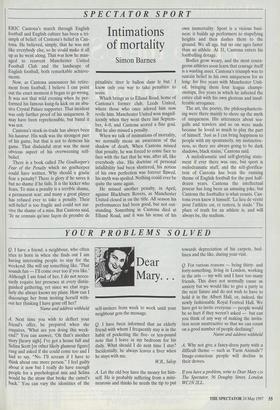SPECTATOR SPORT
Intimations of mortality
Simon Barnes
ERIC Cantona's march through English football and English culture has been a tri- umph of belief: of Cantona's belief in Can- tona. He believed, simply, that he was not like everybody else, so he could make it all up as he went along. That was how he man- aged to reinvent Manchester United Football Club and the landscape of English football, both remarkable achieve- ments.
Now, as Cantona announces his retire- ment from football, I believe I can point out the exact moment it began to go wrong. It was not that wild evening when he per- formed his famous kung-fu kick on an abu- sive Crystal Palace supporter. That incident was only further proof of his uniqueness. It may have been reprehensible, but banal it was not.
Cantona's stock-in-trade has always been his hauteur. His walk was the strongest part of his game, but that is not to demean his game. That disdainful strut was the most obvious aspect of his overweening self- belief.
There is a book called The Goalkeeper's Fear of the Penalty which no goalkeeper could have written. Why should a goalie fear a penalty? There is glory if he saves it but no shame if he fails. It is the kicker who fears. To miss a penalty is a terrible shame, a permanent scar; and many a great player has refused ever to take a penalty. Their self-belief is too fragile and could not sur- vive the shame of a miss. But Cantona said, ne connais qu'une facon de prendre de penalites: firer le ballon dans le but.' I know only one way to take penalties: to score.
Which brings us to Elland Road, home of Cantona's former club, Leeds United, where those who once adored him now revile him. Manchester United won magnif- icently when they went there last Septem- ber, 4-0, and Cantona scored a fine goal. But he also missed a penalty.
When we talk of intimations of mortality, we normally mean an awareness of the shadow of death. When Cantona missed that penalty, he was forced to come face to face with the fact that he was, after all, like everybody else. His doctrine of personal infallibility had been shattered, his notion of his own perfection was forever flawed, his myth was spoiled. Nothing could ever be quite the same again. He missed another penalty, in April, against Blackburn Rovers, as Manchester United closed in on the title. All season his performances had been good, but not out- standing. Something in Cantona died at Elland Road, and it was his sense of his own immortality. Sport is a vicious busi- ness: it builds up performers to stupefying heights and then dashes them to the ground. We all age, but no one ages faster than an athlete. At 31, Cantona enters his footballing dotage.
Bodies grow weary, and the most coura- geous athletes soon learn that courage itself is a wasting asset. Cantona's triumph was to sustain belief in his own uniqueness for so long: for five years with Manchester Unit- ed, bringing them four league champi- onships, five years in which he infected the entire club with his own glorious and insuf- ferable arrogance.
The art, the poetry, the philosophasteris- ing were there mainly to shore up the myth of uniqueness. His utterances about sea- gulls and trawlers and so on were made because he loved so much to play the part of himself. 'Just as I can bring happiness to people with my spontaneity, my instinctive- ness, so there are always going to be dark shadows, black stains,' Cantona said.
A melodramatic and self-glorying state- ment if ever there was one, but sport is melodramatic stuff, and the self-glorifica- tion of Cantona has been the running theme of English football for the past half- dozen years. Cantona the intellectual poseur has long been an amusing joke, but Cantona the footballer is what counts. Can- tona even knew it himself. `Le lieu de verite pour l'athl&te est, et restera, le stade.' The place of truth for an athlete is, and will always be, the stadium.


























































 Previous page
Previous page